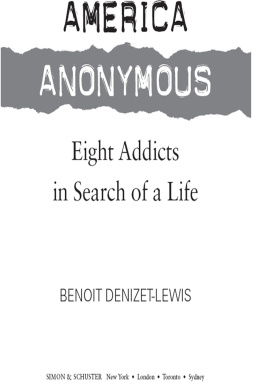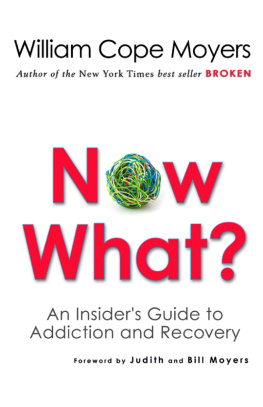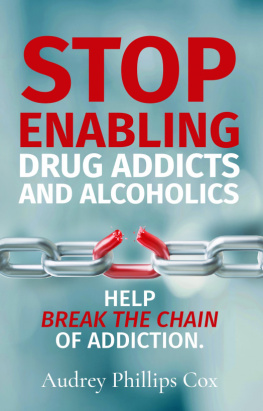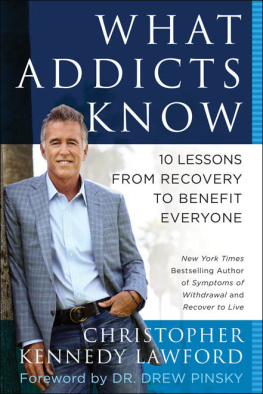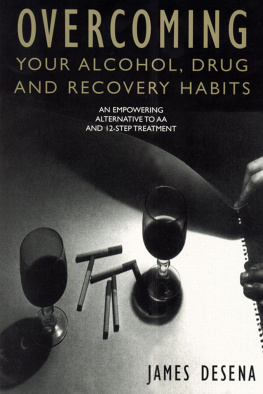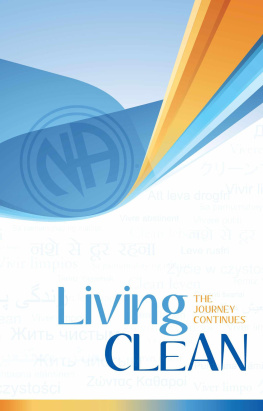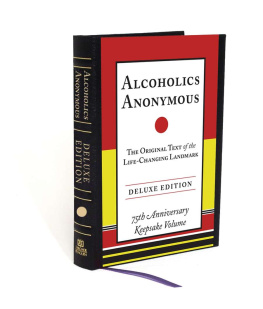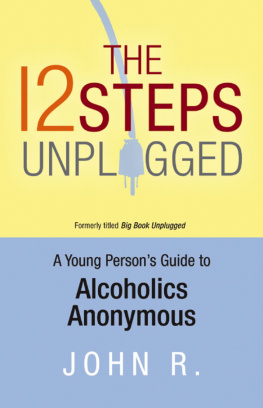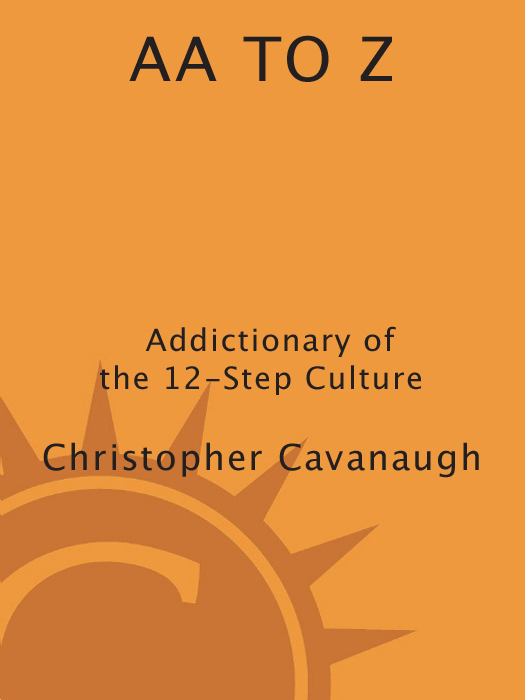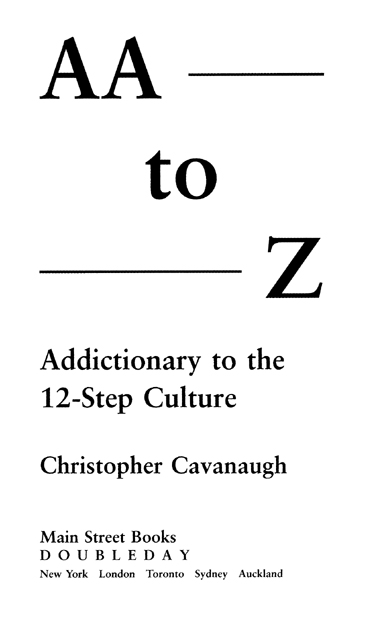
A M AIN S TREET B OOK
PUBLISHED BY DOUBLEDAY
a division of Bantam Doubleday Dell Publishing Group, Inc.
1540 Broadway, New York, New York 10036
M AIN S TREET B OOKS , D OUBLEDAY , and the portrayal of a building with a tree are trademarks of Doubleday, a division of Bantam Doubleday Dell Publishing Group, Inc.
Library of Congress Cataloging-in-Publication Data
Cavanaugh, Christopher.
AA to Z: addictionary to the 12-step culture / Christopher Cavanaugh.
p. cm.
1. Drug addictsDictionaries. 2. Recovering addicts
Dictionaries. 3. AlcoholicsDictionaries. 4. Twelve-step
programsDictionaries. 5. English languageDictionaries.
I. Title.
HV5804.C38 1998
616.860303dc21 97-25139
eISBN: 978-0-307-75856-9
Copyright 1998 by Christopher Cavanaugh
All Rights Reserved
v3.1
In memory of my brother, John Andrew Cavanaugh,
and my father, John Daniel Cavanaugh
For Gail, Maggie, and Cooper, my three greatest loves
Contents
The 12 Steps
of Alcoholics Anonymous
We admitted we were powerless over alcoholthat our lives had become unmanageable.
Came to believe that a power greater than ourselves could restore us to sanity.
Made a decision to turn our will and our lives over to the care of God as we understood Him.
Made a searching and fearless moral inventory of ourselves.
Admitted to God, to ourselves, and to another human being the exact nature of our wrongs.
Were entirely ready to have God remove all these defects of character.
Humbly asked Him to remove our shortcomings.
Made a list of all persons we had harmed and became willing to make amends to them all.
Made direct amends to such people wherever possible, except when to do so would injure them or others.
Continued to take personal inventory and when we were wrong promptly admitted it.
Sought through prayer and meditation to improve our conscious contact with God as we understood Him, praying only for knowledge of His will for us and the power to carry that out.
Having had a spiritual awakening as the result of these steps, we tried to carry this message to alcoholics and to practice these principles in all our affairs.
The 12 Traditions
of Alcoholics Anonymous
Our common welfare should come first; personal recovery depends on A.A. unity.
For our group purpose, there is but one ultimate authoritya loving God as He may express Himself in our group conscience. Our leaders are but trusted servants; they do not govern.
The only requirement for A.A. membership is a desire to stop drinking.
Each group should be autonomous except in matters affecting other groups or A.A. as a whole.
Each group has but one primary purposeto carry its message to the alcoholic who still suffers.
An A.A. group ought never endorse, finance, or lend the A.A. name to any related facility or outside enterprise, lest problems of money, property, and prestige divert us from our primary purpose.
Every group ought to be fully self-supporting, declining outside contributions.
Alcoholics Anonymous should remain forever nonprofessional, but our service centers may employ special workers.
A.A., as such, ought never be organized; but we may create service boards or committees directly responsible to those they serve.
Alcoholics Anonymous has no opinion on outside issues; hence the A.A. name ought never be drawn into public controversy.
Our public relations policy is based on attraction rather than promotion; we need always maintain personal anonymity at the level of press, radio, and films.
Anonymity is the spiritual foundation of all our traditions, ever reminding us to place principles before personalities.
The Twelve Steps and Twelve Traditions are reprinted with permission of Alcoholics Anonymous World Services, Inc. Permission to reprint the Twelve Steps and Twelve Traditions does not mean that A.A. has reviewed or approved the contents of this publication, nor that A.A. agrees with the views expressed herein. A.A. is a program of recovery from alcoholism onlyuse of the Twelve Steps and Twelve Traditions in connection with programs and activities which are patterned after A.A., but which address other problems, or in any other non-A.A. context, does not imply otherwise.
Introduction
Throughout the world today, over two million alcoholics and hundreds of thousands of drug addicts, compulsive overeaters, sex addicts, compulsive gamblers, codependents, and other addicts abstain from their addiction, having found a new life by practicing the 12-Step program of recovery developed by Alcoholics Anonymous. They work each of the 12 Steps and engage in the fellowship of their programs.
Not too many years ago, addicts of all sorts had no means of recovery. That was until the mid-1930s. At that time, an American alcoholic named Rowland H. traveled to Switzerland to undergo treatment from Dr. Carl Jung. Rowland spent a year there, and Dr. Jung helped him to see his inner life and to recognize things that triggered his drinking. Rowland came back to the United States certain that he knew so much about himself that he would never drink again. He was mistaken. In a short time, he got drunk and ended up trapped in the nightmare of alcoholism as badly as ever.
Rowland went back to see Dr. Jung. This time Dr. Jung told him the basic truthto stop drinking Rowland would have to have himself locked up or hire a bodyguard. Jung also told him that if he kept drinking he would probably die. Rowland asked him if there was any grain of hope. Jung told Rowland that in rare cases, people have had a profound spiritual experience that enabled them to stop drinking. These people had huge personality displacements, let go of their old set of beliefs and behaviors, and picked up an entirely new set. Jung also told Rowland that he had been trying to elicit such an experience in him.
Rowland felt that he could accomplish this conversion because he was a man of church and faith. Jung told him that church and faith were not enough. Rowland came back to the States and sought out a new way of life with God at the center. He joined the Oxford movement, an evangelical Christian group modeled after the early church. He joined and never drank again.
Rowland had a drinking buddy named Ebby T. Ebby got himself in trouble with drinking, so much so that he faced jail if his drinking continued. A hopeless alcoholic, Ebby ended up facing a judge once again. Rowland and two other Oxfordians interceded and convinced the judge to release Ebby into their custody. Ebby joined the Oxford movement and went to New York to serve at the Calvary Mission with Dr. Sam Shoemaker, the head of the Oxford movement in America. Ebby had a drinking buddy from childhood who now lived in New York. His name was Bill W.
Ebby knew that Bill was having trouble in his work and trouble with drinking, so when he got to New York he contacted Bill with hope of helping him. Bill was delighted to hear from an old pal. Bill figured that they could drink together, reminisce, and recapture the laughter of their youth. He also welcomed having someone to drink with, because his loneliness and isolation were painful. When Ebby showed up at the door, Bill didnt recognize him. He looked healthy, and sober! Bill invited Ebby in for a drink but Ebby refused, telling Bill that he no longer drank and that he had found religion. Bill thought to himself, Well, hes gone from being a boozing crackpot to a religious crackpot.


